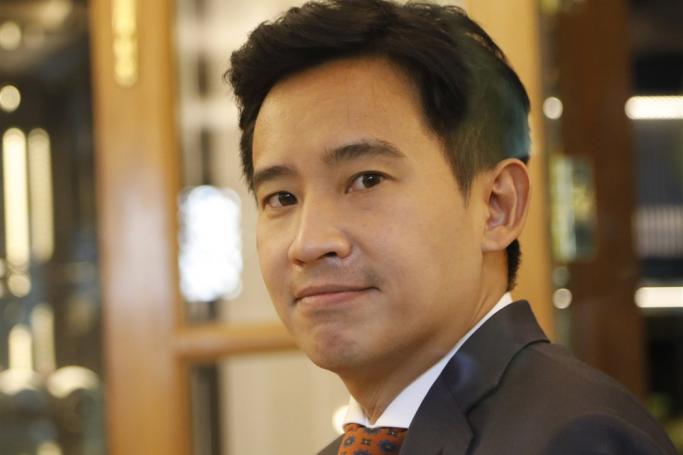Thailand’s Move Forward Party-led coalition plans to create a Myanmar Inter-Agency Task Force under the purview of the Prime Minister's Office to address what it refers to as “Thailand’s Myanmar Dilemma”.
MFP party leader Pita Limjaroenrat said in an address on Facebook 20 June that his party was committed to addressing Thailand’s Myanmar Dilemma.
Pita’s party has just been confirmed by Thailand's Election Commission on 19 June as the largest group with 151 seats in a 500-seat lower house.
The pro-democracy opposition, including the runner up Pheu Thai Party, trounced the army-backed parties that have ruled the kingdom for nearly a decade.
MFP leader Pita is the front-runner to become prime minister, although he faces an investigation that could see him disqualified.
The drawn-out political game to see who will secure leadership, with questions over Pita’s status, have not stopped him from publicly speaking out on a number of issues – an openness that has prompted grumbles from the caretaker administration while the process of creating a government is underway.
Pita recently spoke out in support of the Myanmar people with suggestions for the setting up of a humanitarian bridge to those in need in Myanmar. Now, he is speaking out as controversy swirled over the recent invitation to the Myanmar junta to attend informal ASEAN talks in Bangkok.
Thailand's caretaker government, which is dominated by army-linked parties, last week invited junta foreign minister Than Shwe to the informal two-day meeting, just finished. The move split ASEAN and drew criticism that it is undermining the bloc's efforts to tackle the crisis. However, Thai Prime Minister Prayuth Chan-ocha said the talks were needed.
"We suffer more than others because we share more than 3,000 kilometres of land and sea border with Myanmar," Prayuth told reporters. "We need to talk, otherwise people will be affected. Today is just a meeting, we did not agree on anything."
Pita has now stepped into the fray with an outline of how his “government-in-waiting” would approach the Myanmar crisis that clearly has seriously implications for Thailand.
As he noted in his communique, he said he and his team are closely monitoring the developments concerning Myanmar and have prioritized the issue as a top concern. Of particular concern is the recently publicized divergence of views among ASEAN member states on the best approach to address the unfolding situation in Myanmar.
As he said in his statement: “In light of this, the Move Forward Party and I would like to reaffirm the following points:
“Unwavering Commitment to ASEAN Centrality: We believe in ASEAN-centered actions that lead to ASEAN-led political solutions. We firmly reiterate our support for the actions taken within the ASEAN framework, including those by the previous and current Chairs of ASEAN with a view to achieving the goals and objectives established in the Five-Point Consensus (5PC). As one of the founding members of ASEAN, we attach high importance to unity among ASEAN members and to upholding principles of democracy and human rights as enshrined in the ASEAN Charter.
“Complementarity of Interests of ASEAN and Myanmar's Neighbors: We seek to reinforce the complementarity of interests of ASEAN and Myanmar's neighbors on the situation in Myanmar - a stable, prosperous and economically viable Myanmar as a full-fledged member of ASEAN and the international community. In this regard, we will ensure close coordination and frequent consultation among all parties and key stakeholders on the issue, leading to regional and global peace, security and prosperity.
“Inclusive Engagement for Stabilization: We firmly believe that engagement is a critical component of reaching a final solution. Any engagement strategy must be inclusive, multi-layered, and appropriate to contribute to the stabilization of Myanmar pursuant to the purposes and principles agreed upon within the framework of ASEAN, including those endorsed by ASEAN Leaders at the 42nd ASEAN Summit. We also support ongoing efforts by the United Nations and the United Nations Secretary-General in finding a diplomatic solution to the situation in Myanmar including through the Secretary-General's good offices.
“Human Security Focus: Our strategy for Myanmar prioritizes human security considerations, with a strong emphasis on both the humanitarian and economic aspects. Within Thailand, this may involve the establishment of a Humanitarian-Economic Nexus, providing a platform to not only address the immediate humanitarian crisis but also create opportunities for new human capital to meaningfully contribute to the Thai economy. Regionally, we plan to support an initiative to ensure that the delivery of humanitarian assistance is indiscriminate and inclusive.
“Multi-Dimensional Challenges: Thailand recognizes that the Myanmar dilemma encompasses a wide range of dimensions, including influx of irregular migrants, energy security, telecommunication and online scams, illicit arms trade, transboundary haze, health hazards, human trafficking, and drug smuggling. As part of our comprehensive strategy, the Move Forward Party-led coalition plans to create a Myanmar Inter-Agency Task Force under the purview of the Prime Minister's Office. This task force will coordinate multi-pronged efforts and seek viable solutions to the various aspects of the Myanmar challenges.”
Meanwhile, the Thai election commission is investigating around 200 complaints about the conduct of the May 14 Thai poll.
"We decided to announce the ratification because not all of the complaints can be dealt with within 60 days," commission secretary general Sawang Boonmee said at a press conference. Election law requires the results to be ratified inside 60 days, but the commission has a year to investigate complaints.
Parliament will convene and elect a lower house speaker within 15 days, but there is no set timeline for when they will select a new prime minister.
Additional reporting by AFP












